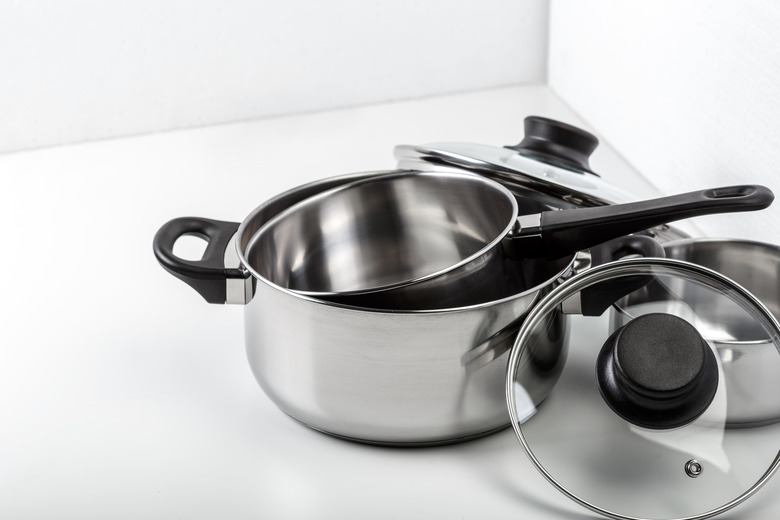How To Store Food In A Stainless Steel Pot
When your stomach is full after a hearty meal, it's easy to get lazy when it's time to clean up and put away the leftovers. One way to make kitchen cleaning faster and save dishes is to simply throw a lid on your cookware and store the leftovers in your metal cooking pots. Some people live by this practice while others worry they could die by it, fearing that toxins in the metal will leach into their food. With so much conflicting information online, it's hard to find the truth about storing food in stainless steel containers.
That's because the answer isn't simple. Stainless steel by itself is safe for your food, but your food could actually damage the cookware. And although the stainless steel is safe, it's often combined with other metals that may not be. Your best bet is to avoid storing leftovers in stainless steel cookware when you can. When you can't, make sure you do so as safely as possible.
Protecting Your Health
Protecting Your Health
According to Clemson University, stainless steel does not leach into foods or cause any illnesses — but that doesn't necessarily mean that stainless steel food containers are safe. Although prized for its durability as well as scratch and corrosion resistance, stainless steel cookware conducts heat very poorly. To overcome this obstacle and promote even cooking, manufacturers often add other metals to their cookware, such as aluminum or copper.
These added metals can leach into stored food, especially if the pan is scratched or pitted. Over time, continuous exposure to food containing these metals can lead to heavy metal poisoning. As such, occasionally storing food in stainless steel cookware is probably fine, but it's not something you should make a habit of.
Note too that stainless steel often contains chromium and nickel. For most people this isn't an issue. Some people, however, are more sensitive to these metals than others. If you're one of them, it's best to avoid both cooking with and storing food in stainless steel.
Protecting Your Cookware
Protecting Your Cookware
You may manage to eat food stored in a stainless steel pot and escape unscathed, but the container may not get so lucky. Acidic foods that contain tomato sauce, vinegar or citrus juice can damage the stainless steel, as can undissolved salt crystals. It's generally safe to cook these foods in stainless steel, but you should avoid storing them in it.
If you do, your cookware could develop small pits. Pitting increases the risk that food will stick to the pot and be hard to remove. It also increases your risk of exposure to metals added to the pan to promote even heating.
Stainless Steel in the Fridge
Stainless Steel in the Fridge
As a general rule, it's safest to store food in glass or plastic containers. If you're in a hurry or if a big holiday meal has used up your usual storage containers, you can store your food in a stainless steel pot. According to AZ Central, however, food stored in stainless steel cookware goes bad faster than food stored in more airtight containers.
To protect yourself from food spoilage, always seal the top of your cookware tightly with plastic wrap or aluminum foil before placing the lid on the pot. Try to place large pots in the back of your refrigerator so smaller containers don't get lost behind them and forgotten. Use leftovers stored in stainless steel as fast as you can so that the food absorbs as little metal as possible.
